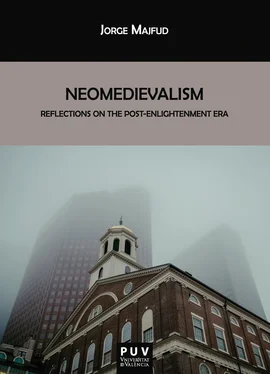According to our vision, which we identify with the latest stage of humanism, the individual of conscience cannot avoid social commitment: to change society so that the latter may give birth, at each step, to a new, morally superior individual. The latest humanism evolves in this new utopian dimension and radicalizes some of the principles of the Modern Era gone by, such as the rebellion of the masses . Which is why we can formulate the dilemma: it is not a matter of left or right but of forward or backward. It is not a matter of choosing between religion or secularism. It is a matter of a tension between humanism and tribalism, between a diverse and unitary conception of humanity and another, opposed one: the fragmented and hierarchical vision whose purpose is to prevail, to impose the values of one tribe on the others and at the same time to deny any kind of evolution.
This is the root of the modern and postmodern conflict. Both The End of History and The Clash of Civilizations attempt to cover up what we understand to be the true problem: there is no dichotomy between East and West, between us and them, only between the radicalization of humanism (in its historical sense) and the conservative reaction that still holds world power, although in retreat—and thus its violence.
TEN LASHES AGAINST HUMANISM
A minor tradition in conservative thought is the definition of the dialectical adversary as mentally deficient and lacking in morality. As this never constitutes an argument, the outburst is covered up with some fragmented and repetitious reasoning, proper to the postmodern thought of political propaganda. It is no accident that in Latin America other writers repeat the US experience, with books like Manual del perfecto idiota latinoamericano (Guide to the Perfect Latin American Idiot, 1996) or making up lists about Los diez estúpidos más estúpidos de América Latina (The Top Ten Stupid People in Latin America). A list that is usually headed up, with elegant indifference, by our friend, the phoenix Eduardo Galeano. They have killed him off so many times he has grown accustomed to being reborn.
As a general rule, the lists of the ten stupidest people in the United States tend to be headed up by intellectuals. The reason for this particularity was offered some time ago by a military officer of the last Argentine dictatorship (1976-1983) who complained to the television cameras about the protesters marching through the streets of Buenos Aires: “I am not so suspicious of the workers, because they are always busy with work; I am suspicious of the students because with too much free time they spend it thinking. And you know, Mr. Journalist, that too much thinking is dangerous.” Which was consistent with the previous project of General Onganía (1966-1970) of expelling all the intellectuals in order to fix Argentina’s problems.
Not long ago, Doug Hagin, in the image of the famous television program Dave’s Top Ten, concocted his own list of The Top Ten List of Stupid Leftist Ideals. If we attempt to de-simplify the problem by removing the political label, we will see that each accusation against the so-called US leftists is, in reality, an assault on various humanist principles.
10: Environmentalism . According to the author, leftists do not stop at a reasonable point of conservation.
Obviously the definition of what is reasonable or not, depends on the economic interests of the moment. Like any conservative, he holds fast to the idea that the theory of Global Warming is only a theory, like the theory of evolution: there are no proofs that God did not create the skeletons of dinosaurs and other species and strew them about, simply in order to confuse the scientists and thereby test their faith. The conservative mentality, heroically inalterable, could never imagine that the oceans might behave progressively, beyond a reasonable level.
9: It takes a village to raise a child . The author denies it: the problem is that leftists have always thought collectively. Since they don’t believe in individualism they trust that children’s education must be carried out in society.
In contrast, reactionary thought trusts more in islands, in social autism, than in suspect humanity. According to this reasoning of a medieval aristocrat, a rich man can be rich surrounded by misery, a child can become a moral man and ascend to heaven without contaminating himself with the sin of his society. Society, the masses, only serves to allow the moral man to demonstrate his compassion by donating to the needy what he has left over—and discounting it from his taxes.
8: Children are incapable of handling stress. For which reason they cannot be corrected by their teachers with red ink or cannot confront the cruel parts of history .
The author is correct in observing that seeing what is disagreeable as an infant prepares children for a world that is not pleasant. Nonetheless, some compassionate conservatives exaggerate a little by dressing their children in military uniforms and giving them toys that, even though they only shoot laser lights, look very much like weapons with laser lights that fire something else at similar targets (and at black people).
7: Competition is bad . For the author, no: the fact that some win means that others lose, but this dynamic leads us to greatness.
He does not explain whether there exists here the “reasonable limit” of which he spoke before or whether he is referring to the hated theory of evolution which establishes the survival of the strongest in the savage world. Nor does he clarify to which greatness he refers, whether it is that of the slave on the prosperous cotton plantation or the size of the plantation. He does not take into account, of course, any kind of society based on solidarity and liberated from the neurosis of competition.
6: Health is a civil right . Not for the author: health is part of personal responsibility.
This argument is repeated by those who deny the need for a universal health care system and, at the same time, do not propose privatizing the police, and much less the army. Nobody pays the police after calling 911, which is reasonable. If an attacker shoots us in the head, we will not pay anything for his capture, but if we are poor we will end up in bankruptcy so that a team of doctors can save our life. One deduces that, according to this logic, a thief who robs a house represents a social illness, but an epidemic is nothing more than a bunch of irresponsible individuals who do not affect the rest of society. What is never taken into account is that collective solidarity is one of the highest forms of individual responsibility.
5: Wealth is bad . According to the author, leftists want to penalize the success of the wealthy with taxes in order to give their wealth to the federal government so that it can be spent irresponsibly helping out those who are not so successful.
That is to say, workers owe their daily bread to the rich. Earning a living with the sweat of one’s brow is a punishment handed down by those successful people who have no need to work. There is a reason why physical beauty has been historically associated with the changing but always leisurely habits of the aristocracy. There is a reason why in the happy world of Walt Disney there are no workers; happiness is buried in some treasure chest filled with gold coins. For the same reason, it is necessary to not squander tax monies on education and on health. The millions spent on armies around the world are not a concern, because they are part of the investment that States responsibly make in order to maintain the success of the wealthy and the dream of glory for the poor.
4: There is an unbridled racism that will only be resolved with tolerance . No: leftists see race relations through the prism of pessimism. But race is not important for most of us, just for them.
Читать дальше












